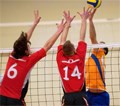FIVB president’s plan to retire may just be a power game

20.05.2008
By Kirsten Sparre"Acosta will not resign," says Mario Goijman from Argentina who received the Play the Game Award in 2005 for his documentation of and legal battle against the corruption in FIVB under the reign of Ruben Acosta.
Goijman has observed the way Acosta operates for many years, and he believes that Acosta’s announcement is a ruse to quell any internal opposition.
"Nobody will dare run for president because they know that this announcement is a trial ballot. Anyone who says 'I would like to be president' will be expelled. Acosta has already declared to the news agency EFE that if nobody applies to be the new president 'I will have to reconsider my decision'," Goijman says to Play the Game.
Goijman’s analysis is shared by Jean-Pierre Seppey who was secretary general for the FIVB under Acosta until he was fired and eventually founded and became president of the World Volleyball and Beach Volleyball Federation (WVBF).
"I don’t believe Acosta will retire. He declared the same thing at the 2002 FIVB congress in Buenos Aires and after the 2004 Olympic Games in Athens. His announcement, as usual, is only made to observe who will be willing to stand against him in order to kill him," Seppey believes.
Retirement unlikely to change FIVB culture
According to the press release from FIVB, Acosta wants to devote all his time to his family and his private affairs now the federation has become strong after 24 years under his leadership. The press release goes on to say that all members of the FIVB Board of Administration were surprised and tried to make him go back on his decision and that Acosta is now re-considering although it is "very unlikely that he would change his mind between now and the middle of June."
Should Acosta retire, the current First Executive Vice-President, 72-year old Wei Jizhong from China, would take over as president until the presidential term expires in two years time, and Cristobal Marte from the Dominican Republic would be come First Executive Vice-President.
These potential changes at the helm of the FIVB are, however, unlikely to change the culture of the FIVB, the critics say.
Lasse Svensson is a Swedish volleyball leader whom the FIVB in 2001 banned from working with volleyball nationally and internationally after he indirectly criticised the FIVB in a private letter to the chairman of the European Volleyball Federation. Svensson has now joined the World Volleyball and Beach Volleyball Federation (WVBF) , and he has little hope that if Acosta retires, things will improve in FIVB.
"Forget about democractic changes. If Acosta retires this way, FIVB will avoid proper elections and will have time to groom a new president from within the present board. Acosta will no doubt promote his trusted henchman Cristobal Marte who embodies the same corrupt ideas," Svensson says.
Last year, professor Hans Peter Graf, president of the privately organised World Sport Ethics Commission, published a report that accused Cristobal Marte of cheating with the ages of players and manipulating a doping sanction in complicity with Ruben Acosta. The case has also been reported to the IOC (see FIVB cheats in doping case and violates IOC Code of Ethics)
"What should happen if Acosta retires, is a transparent election process with candidates nominated by federations all over the world. And the elections should be democratic without following all the elaborate rules that Acosta set up before the last election to outmanouevre all other candidates," Svensson says to Play the Game (see FIVB rules make it impossible to challenge president).
The FIVB Congress takes place in Dubai on 16 and 17 June
Related links:





